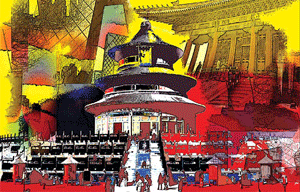Eye on the future
Updated: 2011-11-04 08:55
By Liu Lu (China Daily)
|
|||||||||
"Dafen's emergence as a huge art cluster has helped Shenzhen, China's first special economic zone, to shed the tag of a 'cultural desert'," Zhou says.
According to Zhou, artists in Dafen are not unduly worried about copyright infringements, because almost all the copied masterpieces are drawn by famous artists who died 50 years ago and hence do not enjoy any copyright protection. But there are also some new and famous artists who are willing to be imitated, as it is a sure-fire way of improving visibility.
With the ability to efficiently produce copies of original paintings in bulk and its proximity to Hong Kong, the replication business developed at a surprising speed in Dafen. Oil paintings from Dafen have enjoyed success in the US and Europe because of their high quality and affordable prices.
Undoubtedly the best-seller in Dafen is the replica of Mona Lisa. A fast painter can draw up to seven or eight copies a day. A reproduction of Da Vinci's enigmatic lady costs just 200 yuan at a wholesaler in Dafen, but commands prices of over $2,000 (1,463 euros) in a US gallery, says Zeng Qunce, 42, a veteran artist from Dafen.
|
 Reproductions make Dafen the world's largest mass producer of oil paintings. [Liu Lu / China Daily]
|
"Although drawing replicas is easier than original ones, it means we stay at the bottom of the supply chain and hence are most vulnerable to market wobbles," Zeng says. He worked as a copy worker for many years but started his own creations in 2008.
Before 2008, 90 percent of the imitation works in Zeng's shop were sold to art dealers from the US and Europe.
"Hotels and house owners in the US and Europe were the largest consumers in Dafen before the global financial crisis."
But with overseas orders plummeting, many like Zeng have been forced to scout for better prospects in the domestic markets.
"With the rapid improvement in living standards, domestic demand for oil paintings has been rapidly rising in recent years. But unlike Westerners, Chinese buyers are not too keen on copies of masterpieces," Zeng says.











